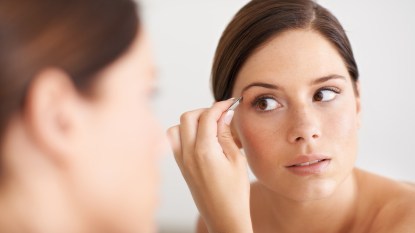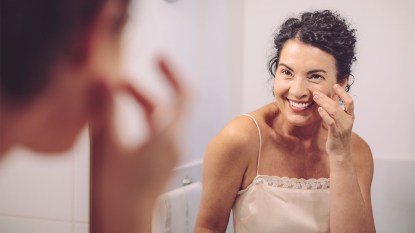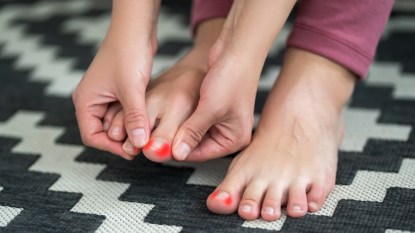How Often Should You Wash Your Hair? (The Answer Might Surprise You)
It depends on your hair type.

When it comes to hair care, much of the conversation revolves around picking the best shampoo and conditioner, steering clear of products that cause dryness and breakage (especially if your natural hair texture is coarse), and finding a hair look that matches your hair type. (The latter is as much about maintaining healthy hair as anything — a style and cut that’s matched to your texture, volume, thickness, and length requires fewer heat tools, styling products, and contortions like teasing and backcombing, all of which can damage hair.)
However, something that comes up less often in conversations around hair needs is washing; specifically, how often should you wash your hair? Shampooing and conditioning is essential for keeping your scalp and hair clean, but overwashing can do more harm than good, right? The answer depends on several factors. Here’s everything you need to know about lathering your locks.
Should I wash my hair every day?
If you grew up thinking that daily hair washing was important, you’re not alone. For many years, this was the prevailing wisdom. However, we now know that it’s actually best to avoid washing your hair every day. There are a few exceptions, of course: If you have thin hair or you’ve sweat a lot because of exercise or climate. In these cases, washing your hair every day could be beneficial.
That said, most of us should skip daily washings, even if you’re only using dry shampoo. Why? Because when we strip the natural oils from our hair too often, it can cause it to dry out, leading to frizz, breakage, and even skincare issues. It can also cause your hair shafts to overproduce oil in response to dryness, which can lead to the feeling and appearance of oily hair.
For the most part, you should skip washing your hair every day unless it’s absolutely necessary. Instead, keep these hair-washing tips in mind. (They work for thick hair, curly hair, dry hair, and everything in between.)
Hair Type and Washing Schedule
Different hair types will need to adhere to different washing schedules. Here are tips for various hair types.
Oily Hair
It can be tempting to wash your hair every day if you have oily hair, but that can actually make the situation more difficult to manage. If your natural hair is stripped of all its sebum (a.k.a., oil) daily, it can actually create excess oil in an attempt to rehydrate. Instead, it’s best to wash your hair every two days when possible. This will keep the appearance of oily hair at bay without increasing production of oil in the hair. It’s also important to consider the condition of your scalp. Dandruff can be caused by excess oil, not just dryness. If you have an oily scalp or visible dandruff, you might want to consult your hair stylist or see a dermatologist.
Dry Hair
Dry hair, by contrast, should be washed far less often than oily hair, as washing too often can contribute to further dryness and a dry scalp. It’s recommended that people with dry hair wash every five to seven days. If your hair is especially curly or textured, you might extend this an extra two to three days. The protracted time between washing allows the hair to produce more natural oils, which soothes the scalp and seals the hair shaft.
What are the signs that it’s time to wash your hair?
It’s important to note that, when it comes to hair care routines, there’s no one-size-fits-all. Even your individual routine will require changing according to your environment, workout schedule, and hormone fluctuations. Similarly, if you change your styling routine or have your hair colored, your washing regimen should reflect this, as product remnants and other buildup will be a factor. Here are a few indications that it’s time to wash your hair.
Oily Hair
Those with oily hair are acutely aware of excess oil production. If you notice a gummy feeling in your roots, it’s likely time for a wash. This is particularly true if you usually have dry hair:
Hair Product Build Up
There are styling products available for everything from volumizing curls and protecting from heat, to reducing frizz. Frequent use of these products, however, causes buildup, which can lead to itchiness and irritation of the scalp. If you notice product buildup on your scalp or in your hair, it’s time for a wash.
Your Hair Has Lost Its Shape
You’ve spent time at the hairstylist picking out the perfect cut for your face shape and personal style. When that cut loses shape and your locks start to droop, it’s time for a wash (or a trim). (Hair follicles that are weighed down by product or oil lay flat and lack volume.) While there are several possible reasons for this change in volume, like stress, pregnancy, and hormone fluctuations, a wash is a simple solution to try.
You Notice More Dandruff
An increase in dandruff production is related to an increase in the production of oil in your hair. One common misconception is that dandruff is produced when the scalp and hair get dry, but it’s actually the opposite. Excess oil production can lead to dandruff, and that’s a clear indication that your hair needs a wash. Dandruff often contributes to an itchy scalp, as well, so watch for signs of both flaking and itchiness at the scalp.
If you do experience dandruff regularly, you’ll want to create a wash routine specifically designed to mitigate production. One of the simplest changes you can make is to swap out your regular shampoo for a dandruff shampoo once or twice a week. Exfoliating your scalp is helpful for reducing dandruff build-up and making your scalp feel clean. It’s important to note that there are different reasons you may experience flaking. While dandruff is a common cause of scalp flaking, different types of dermatitis and conditions like eczema and psoriasis have similar symptoms. If dandruff management doesn’t seem to be doing the trick, another condition might be at play — consult your dermatologist for professional guidance.
Your Hair is Tangling
Depending on your hair type and texture, you may be used to the occasional tangle or knot. But if you begin to notice a significant increase in the number or complexity of your knots, a wash may be in order. As product and oil buildup develop, it can actually cause the hair to tangle more often and may make it difficult to run a brush through your hair. Not only will washing help you to brush your hair without pain, but it will make it smooth and easier to style.
The Last Word on Washing Your Hair
Establishing a hair washing schedule may seem simple, but given this routine’s effect on hair growth and hair health, it’s something that you should carefully consider. Washing hair too often can strip essential oils from hair, sparking either an overproduction of oils or dryness in response (depending on your hair type). There are a few ways to determine when it’s time for the next wash. Keep an eye out for signs of product buildup, excess oil production, or a sudden increase in the number of tangles or knots that appear in your hair.
You’ll also want to keep an eye out for changes to your hair’s shape and volume, as product and oil buildup can weigh hair down and cause it to be flat and frizzy. By refraining from washing your hair every day, your locks will have a smoother and more lustrous appearance.













